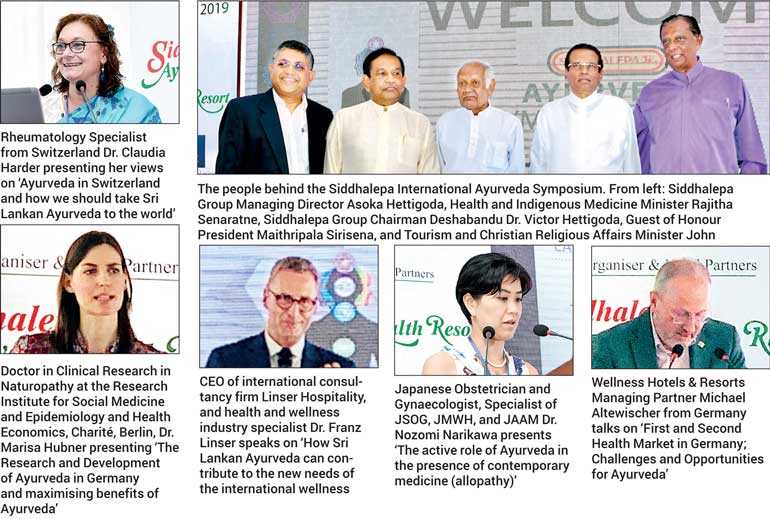Thursday Feb 26, 2026
Thursday Feb 26, 2026
Sunday, 13 October 2019 22:04 - - {{hitsCtrl.values.hits}}

Guests of Honour, Ministers, Directors, and staff of Siddhalepa Group with the foreign and local delegates at the Siddhalepa International Ayurveda Symposium
Ayurveda practitioners from Europe and the United States placed Ayurveda, the ancient Sri Lankan form of medicine, on an international platform at the Siddhalepa International Ayurveda Symposium held at the Siddhalepa Ayurveda Resort, Wadduwa, last weekend.
In a ground-breaking forum, delegates and Ayurveda practitioners from the UK, the USA, Germany, France, Austria, and Japan presented their research and views on the science, power, and effectiveness of this alternate form of medicine, its growing global acceptance and popularity, and holistic approach to a healthy living.
The first-of-its-kind forum, organised by Siddhalepa, was graced by President Maithripala Sirisena, Tourism and Christian Religious Affairs Minister John Amaratunga, and Health and Indigenous Medicine Minister Rajitha Senaratne who were the Guests of Honour at the event.

Among the speakers were internationally acclaimed Ayurveda practitioners who spoke on a wide range of topics including: ‘The history and evolution of indigenous medicine in Sri Lanka’ by Professor Raj Somadeva, (Professor of Archaeology, Postgraduate Institute of Archaeology, University of Kelaniya, Sri Lanka); ‘Ayurveda in the UK and Europe': Its growth, legality, and its future’ by Dr. Shantha Godagama, UK (Doctor of Ayurvedic Medicines, Acupuncturist, and Marmapuncturist, Advisor to the British Government and the British Parliament Committee on Ayurveda); ‘Ayurveda in Switzerland and how we should take Sri Lankan Ayurveda to the world’ by Dr. Claudia Harder, Switzerland (Specialist Doctor in Rheumatology); ‘The research and development of Ayurveda in Germany’ by Dr. Marisa Hubner (Doctor in Clinical Research in Naturopathy at the Research Institute for Social Medicine and Epidemiology and Health Economics, Charité, Berlin); ‘How Sri Lankan Ayurveda can contribute to the new needs of the international wellness tourist’ by Dr. Franz Linser, Austria (Austrian international consultancy firm Linser Hospitality CEO, specialising in health and wellness industries); ‘The Initiative and the contribution by King Ravana to the indigenous medical system of Sri Lanka’ by Dr. Suriya Gunasekara (former Additional Secretary to Ministry of Cultural Affairs, former Secretary to All Ceylon Buddhist Congress); ‘The active role of Ayurveda in the presence of contemporary medicine (allopathy)’ by Dr. Nozomi Narikawa, Japan (Obstetrician and Gynaecologist, Specialist of JSOG, JMWH, and JAAM); ‘First and second health market in Germany: Challenges and opportunities for Ayurveda’ by Micheal Altewicher, Germany (Managing Partner – Wellness Hotels & Resorts); ‘The scientific approach to Sri Lankan Ayurveda’ by Dr. Vajira Seneviratne (Head and Senior Scientist at the Ayurveda Research Institute, Department of Ayurveda).
A key outcome of the forum was a pledge to win over the foreign health insurance companies to include a cover for Ayurveda treatment. The acceptance of Ayurveda as an alternate form of medicine and its inclusion in all medical insurance covers across the health sector would be considered a comprehensive win for the acceptance of Ayurveda medicine and its emergence as effective alternative medicine.
The forum also discussed key issues related to promoting health tourism and making Sri Lanka a premier world destination for Ayurveda tourism.
Among the main focus areas were understanding and catering to the current and changing demands of health tourists and preparing Sri Lanka’s Ayurveda tourism industry to cater to these international standards. The developing and changing trends in Ayurveda tourism and why Sri Lanka should focus on promoting it and its benefits to our nation were also discussed.
Among the other objectives of the forum was to educate the international community on the heritage of Sri Lankan ‘hela osu’ and ‘desheeya chikithsa’, which could be traced back to the days of King Ravana, and to highlight the advances in Sri Lanka’s Ayurvedic medicines and research.
Presenting Sri Lanka’s rich bio-diversity and its medicinal plants to an international audience is a core aspect of this process. The forum also provides a platform to partner with key international institutes for further knowledge-sharing and research.
Siddhalepa, as the chief organiser and sponsor of the event, leads the way as the main torchbearer for the forward march to make Sri Lanka a premier medical tourist destination in the world.
The company, a leading Ayurveda products manufacturer, best known for its flagship brand Siddhalepa, has worked with conviction and dedication to promote Ayurveda tourism in Sri Lanka. To achieve this status, the company built its infrastructure with plantations to source its raw material for Ayurveda medicines, expanding to include an Ayurveda resort, Ayurveda hospital, and Ayurveda centres, all of which have been set up to operate according to international standards with ISO certifications.
Their Ayurveda resort hotel, Siddhalepa Ayurveda Resort, Wadduwa, won the Best Hotel and Wellness Spa Brand award at the SATA Awards recently.
International media from Australia, Japan, China, Russia, Germany, and Thailand were present to cover the two-day event. While the first day concluded with presentations from the international participants, leading up to an evening of entertainment, on the second day, guests were introduced to the varying aspects of Ayurveda. This included a tour of Siddhalepa Resort’s herbal garden, an Ayurveda cookery demonstration, Ayurveda tea and elixir tasting, a factory visit and tour of the research and development centre, and an authentic Shanthi karma presentation, presenting a 360-degree experience of ancient Ayurveda to the invitees and guests.
SriLankan Airlines, Turkish Airlines, Polish Airlines, and the Sri Lanka Tourism Promotions Bureau were co-sponsors of the forum, which was organised in collaboration with the Ministries of Tourism, and Health and Indigenous Medicine.